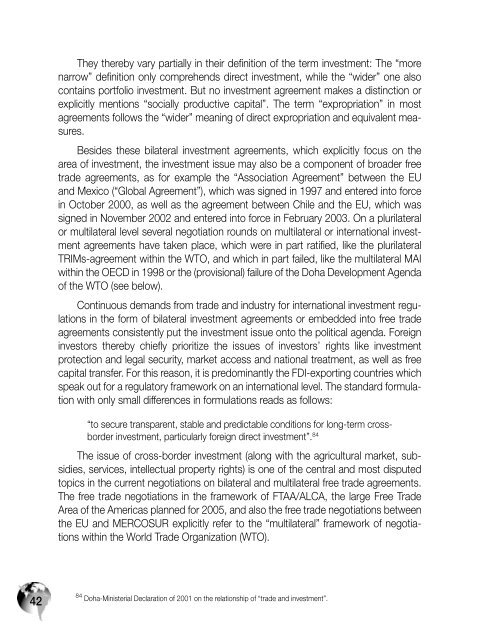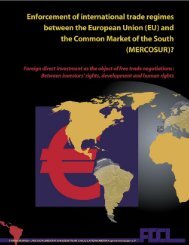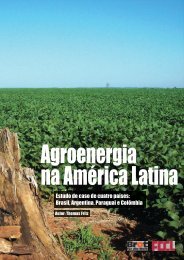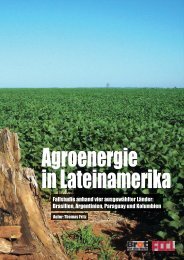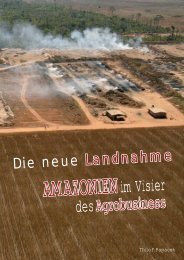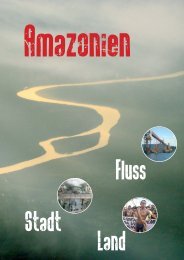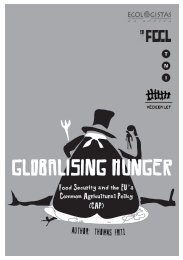(EU) and the Common Market of the South (MERCOSUR)? - FDCL
(EU) and the Common Market of the South (MERCOSUR)? - FDCL
(EU) and the Common Market of the South (MERCOSUR)? - FDCL
Create successful ePaper yourself
Turn your PDF publications into a flip-book with our unique Google optimized e-Paper software.
42<br />
They <strong>the</strong>reby vary partially in <strong>the</strong>ir definition <strong>of</strong> <strong>the</strong> term investment: The “more<br />
narrow” definition only comprehends direct investment, while <strong>the</strong> “wider” one also<br />
contains portfolio investment. But no investment agreement makes a distinction or<br />
explicitly mentions “socially productive capital”. The term “expropriation” in most<br />
agreements follows <strong>the</strong> “wider” meaning <strong>of</strong> direct expropriation <strong>and</strong> equivalent measures.<br />
Besides <strong>the</strong>se bilateral investment agreements, which explicitly focus on <strong>the</strong><br />
area <strong>of</strong> investment, <strong>the</strong> investment issue may also be a component <strong>of</strong> broader free<br />
trade agreements, as for example <strong>the</strong> “Association Agreement” between <strong>the</strong> <strong>EU</strong><br />
<strong>and</strong> Mexico (“Global Agreement”), which was signed in 1997 <strong>and</strong> entered into force<br />
in October 2000, as well as <strong>the</strong> agreement between Chile <strong>and</strong> <strong>the</strong> <strong>EU</strong>, which was<br />
signed in November 2002 <strong>and</strong> entered into force in February 2003. On a plurilateral<br />
or multilateral level several negotiation rounds on multilateral or international investment<br />
agreements have taken place, which were in part ratified, like <strong>the</strong> plurilateral<br />
TRIMs-agreement within <strong>the</strong> WTO, <strong>and</strong> which in part failed, like <strong>the</strong> multilateral MAI<br />
within <strong>the</strong> OECD in 1998 or <strong>the</strong> (provisional) failure <strong>of</strong> <strong>the</strong> Doha Development Agenda<br />
<strong>of</strong> <strong>the</strong> WTO (see below).<br />
Continuous dem<strong>and</strong>s from trade <strong>and</strong> industry for international investment regulations<br />
in <strong>the</strong> form <strong>of</strong> bilateral investment agreements or embedded into free trade<br />
agreements consistently put <strong>the</strong> investment issue onto <strong>the</strong> political agenda. Foreign<br />
investors <strong>the</strong>reby chiefly prioritize <strong>the</strong> issues <strong>of</strong> investors’ rights like investment<br />
protection <strong>and</strong> legal security, market access <strong>and</strong> national treatment, as well as free<br />
capital transfer. For this reason, it is predominantly <strong>the</strong> FDI-exporting countries which<br />
speak out for a regulatory framework on an international level. The st<strong>and</strong>ard formulation<br />
with only small differences in formulations reads as follows:<br />
“to secure transparent, stable <strong>and</strong> predictable conditions for long-term crossborder<br />
investment, particularly foreign direct investment”. 84<br />
The issue <strong>of</strong> cross-border investment (along with <strong>the</strong> agricultural market, subsidies,<br />
services, intellectual property rights) is one <strong>of</strong> <strong>the</strong> central <strong>and</strong> most disputed<br />
topics in <strong>the</strong> current negotiations on bilateral <strong>and</strong> multilateral free trade agreements.<br />
The free trade negotiations in <strong>the</strong> framework <strong>of</strong> FTAA/ALCA, <strong>the</strong> large Free Trade<br />
Area <strong>of</strong> <strong>the</strong> Americas planned for 2005, <strong>and</strong> also <strong>the</strong> free trade negotiations between<br />
<strong>the</strong> <strong>EU</strong> <strong>and</strong> <strong>MERCOSUR</strong> explicitly refer to <strong>the</strong> “multilateral” framework <strong>of</strong> negotiations<br />
within <strong>the</strong> World Trade Organization (WTO).<br />
84 Doha-Ministerial Declaration <strong>of</strong> 2001 on <strong>the</strong> relationship <strong>of</strong> “trade <strong>and</strong> investment”.


